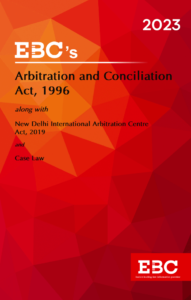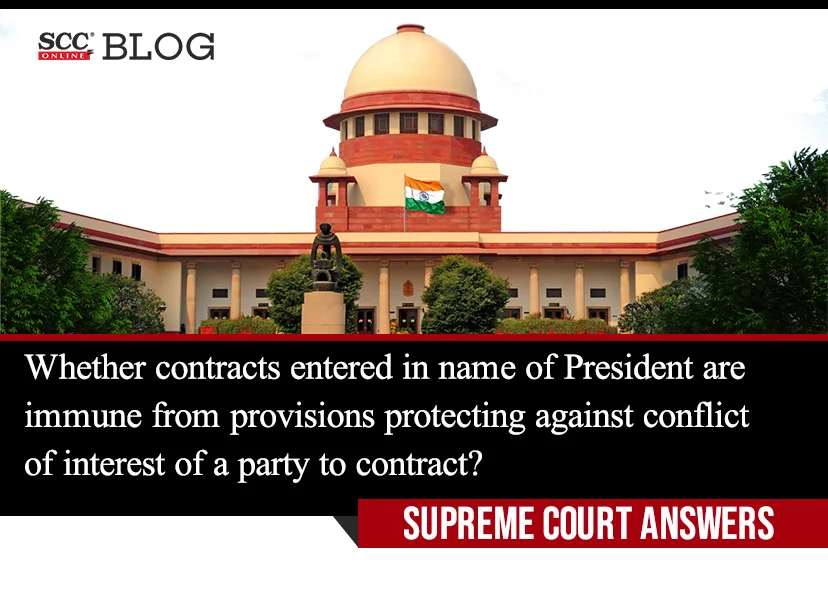Supreme Court: In an application under Section 11(6) of the Arbitration and Conciliation Act, 1996 for the appointment of a Sole Arbitrator by Glock Asia-Pacific Ltd, the Three-Judge Bench of Dr Dhananjaya Y Chandrachud, CJI, PS Narasimha* and J.B. Pardiwala, JJ. allowed the present application and appointed Justice Indu Malhotra, a former judge of Supreme Court as the sole Arbitrator to adjudicate upon the disputes arising under and in connection with the Conditions of Tender entered between the parties, subject to the mandatory disclosures under the amended Section 12 of the Arbitration and Conciliation Act, 1996. Further, it opined that a contract entered in the name of the President, cannot create an immunity against the application of any statutory prescription imposing conditions on parties to an agreement, when the Government chooses to enter a contract.
Background
The Ministry of Home Affairs (Procurement Division) floated a single party tender for supply of Glock Pistols. The bid was confirmed in favor of the applicant and a Tender of Acceptance was issued by the respondent. Clause 6 of the Tender of Acceptance requires the applicant to submit a performance bond of 10% of the value of the contract. The applicant furnished the performance bank guarantee (‘PBG’) on 24-08-2011 and proceeded to perform its contractual obligations. In fact, by 06-08-2012 delivered the entire supply under the contract. The Government accepted the consignment and paid the entire consideration by 11-11-2012.
The PBG was extended from time to time during the subsistence of the contract and thereafter for nine years after the completion of the delivery and final payment under the contract. On 31-05-2021, the applicant informed the respondent that the PBG will not be extended any further. The Government immediately invoked the PBG, citing Clauses 11 and 18(c) of Schedule II of the Acceptance of Tender.
The applicant issued a notice invoking arbitration and nominated a retired Judge of the Delhi High Court as the Sole Arbitrator. The respondent was called upon to accept the nomination within 15 days. Replying to the notice invoking Arbitration, the respondent by a letter stated that the nomination was contrary to Clause 28 of the Conditions of Tender, as per which disputes are to be referred to arbitration by an officer in the Ministry of Law, appointed by the Secretary of Ministry of Home Affair. Thus, the applicant, being a foreign company, filed the present application.
Contracts expressed in the name of the President of India
The Government submitted that the contract in the present case stands on a different footing as it is entered into in the name of the President of India. The phrase ‘expressed to be made’ and the word ‘executed’ are intended to mean that there must be a deed or contract, in writing, and executed by a person duly authorized by the President of the Governor in that behalf.
Further, it was contended that for contracts expressed to be made by the President of India, the ineligibility of appointment as an arbitrator as contemplated under Section 12(5) of the Act, read with Schedule VII, will be inapplicable.
The Court considered the purpose and object of Article 299 and opined that a contract entered in the name of the President of India, cannot and will not create an immunity against the application of any statutory prescription imposing conditions on parties to an agreement, when the Government chooses to enter a contract.
Thus, the Court rejected the contention of the Government that the contracts entered by the Union of India in the name of the President of India are immune from provisions that protect against conflict of interest of a party to a contract, under Section 12(5) of the Act.
Conflict of the Arbitration Clause with Section 12(5) read with paragraph 1 of the Seventh Schedule of the Act
The Court noted that the Arbitration clause enables the Secretary, Ministry of Home Affairs, to appoint an arbitrator for the resolution of disputes arising out of this contract. The Ministry of Home Affairs is a party to the contract. The arbitration clause enables the Secretary representing the Ministry to appoint an officer in the Ministry of Law as the arbitrator. In other words, the proposed arbitrator would be an employee of the Ministry of Law and Justice, Government of India, and at the same time, the appointing authority, the Secretary of the Ministry of Home Affairs, is also an employee of the Government of India.
The Court said that the arbitration clause which authorises the Secretary, Ministry of Home Affairs, whose relationship with Union of India is that of an employee, to nominate an officer of the Ministry of Law and Justice to act as a Sole Arbitrator, clearly falls within the expressly ineligible category provided in Paragraph 1 of Schedule VII, read with Section 12(5) of the Act.
The Court also took note of Perkins Eastman Architects DPC v. HSCC (India) Ltd., (2020) 20 SCC 760, wherein it was held that any person who has an interest in the outcome of the dispute would be ineligible to be an arbitrator.
As the grounds of challenge to the appointment of an arbitrator under Section 12(5) of the Act operate notwithstanding any prior agreement to the contrary, the Court refused to give effect to the appointment of an officer of the Ministry of Law and Justice as an arbitrator.
Reliance of Government on the decision in Central Organisation of Railway Electrifications case
The Court said that the arbitration clause in the present case enables a serving employee of the Union of India, a party to the contract, to nominate a serving employee of the Union of India as the Sole Arbitrator. Such an authorisation is clearly distinct from the arbitration clause in Voestalpine Schienen GmbH v. Delhi Metro Rail Corpn. Ltd., (2017) 4 SCC 665 and Central Organisation for Railway Electrification v. ECI-SPIC-SMO-MCML (JV), (2020) 14 SCC 712 and conflicts with Section 12(5) of the Act. Further, the correctness of judgment of Central Organisation of Railway Electrifications has been challenged and referred to a larger bench.
However, the Court said that as the said decision is not applicable in the present case, its reference to the larger Bench will have no bearing on the outcome of the present case.
[Glock Asia-Pacific Ltd. v. Union of India, 2023 SCC OnLine SC 664, decided on 19-05-2023]
*Judgment Authored by: Justice PS Narasimha
Know Thy Judge | Supreme Court of India: Justice Pamidighantam Sri Narasimha
Buy Arbitration and Conciliation Act, 1996 published by EBC HERE








